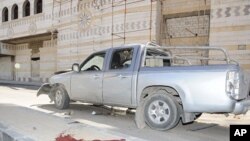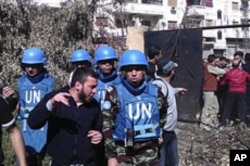A nearly two-week old U.N.-brokered cease-fire in Syria continued to fray Tuesday, amid reports of government shelling in the country's third and fourth largest cities of Homs and Hama, despite visits to those areas by U.N. observers. A bomb blast was also reported in the center of Damascus.
U.N. observers continued their mission to Syria's fourth largest city of Hama Tuesday, speaking to residents who voiced anger over government attacks in their area.
Witnesses say government troops shelled parts of Homs, Hama and the Damascus suburb of Douma during the past 48 hours. Opposition activists say the attacks took place just after U.N. observers visited those regions. Government tanks stormed two other Damascus suburbs.
Despite an international cease-fire, the Syrian government says it will respond to what it calls "armed terrorists."
A spokesman for the U.N. observers, Neeraj Singh, said that the initial team of six has been strengthened to 11. A larger team of 300 is expected in the near future.
"The team spent a considerable amount of time going around, meeting with the people but also conducting patrols afterwards," Singh said. "Contacts are continuing, we are establishing liaisons with all the parties, preparing the ground for the larger mission coming in."
Syrian state TV reported that a car bomb went off in central Damascus with several casualties reported. At least three members of the government's military intelligence forces were also reported to have been killed elsewhere.
Timor Goksel, the former spokesman of the U.N. peacekeepers in Lebanon. defended the observer mission in Syria. He said it will take time for the team to deploy and get acclimated, but that it would ultimately have a positive effect on the situation.
"Once they are there in force with the proper command structure, then they will try to start making themselves felt by going to trouble spots and doing reporting," said Goksel. "We are hoping to get unbiased, neutral, impartial reports that we don't get from anybody else and by their presence in the area, they will calm down the situation and help contribute to an atmosphere of dialogue of some sort, but they are not the ones who are going to solve this problem."
Goksel said that extra time is needed to get the full observer team on the ground, since the Syrian government insists on approving what nations will participate.
Analyst Nadim Shehadi of Chatham House in London, however, said that time is of the essence in deploying the U.N. observer team.
"We should not repeat the Iraq experience of the '90s of allowing Saddam Hussein to massacre his people while the world is undecided about what to do," said Shehadi. "Time is not a neutral element. Time is measured by people being killed and by the regime gaining an upper hand."
In an interview with the Arab daily Al Hayat, Tunisian President Moncef Marzouki insisted that Syrian President Bashar al-Assad would ultimately be forced out of office "dead or alive." But, he warned Mr. Assad, "it is better for you to leave with your family alive," so as to avoid the "deaths of tens of thousands of innocents."
| Join the conversation on our social journalism site - Middle East Voices. Follow our Middle East reports on Twitter and discuss them on our Facebook page. |









